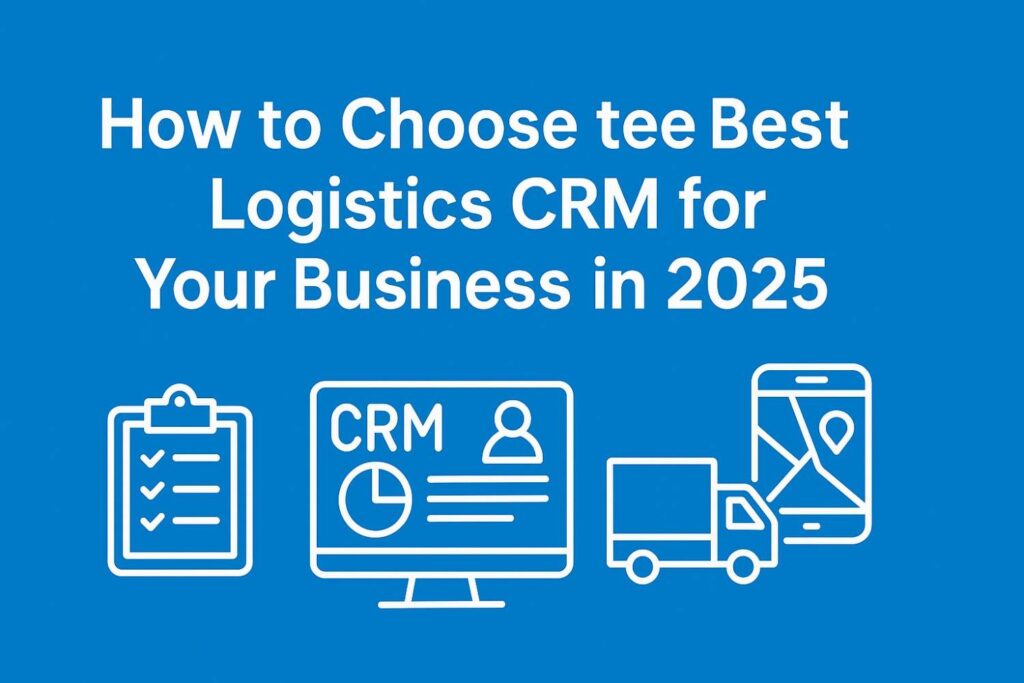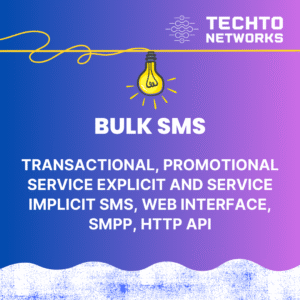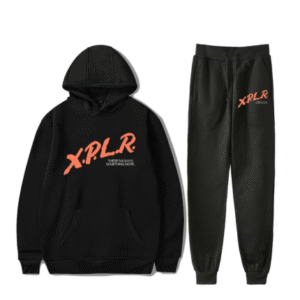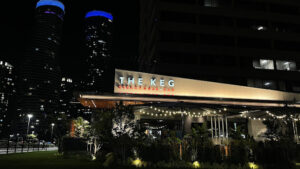
Introduction
Choosing the right logistics CRM in 2025 feels a lot like swiping through dating apps—there are plenty of options, most look promising at first glance, and yet only a handful will actually understand your quirks (and yes, every business has them). The logistics industry is no longer about moving boxes from point A to point B—it’s about speed, visibility, and customer experience. One misstep, and suddenly a late delivery becomes a viral tweet. That’s where a CRM steps in: to organize chaos, streamline communication, and remind us that technology, when chosen wisely, can be the best wingman for business growth.
Understanding the Role of Logistics CRM
Think of a logistics CRM as the conductor of an orchestra—without it, the trumpets blast over the violins, and nobody claps at the end. Logistics involves too many moving parts: shipments, invoices, drivers, customers, warehouses. Without a central hub, these pieces operate in silos, and things inevitably slip through the cracks (usually the most expensive things). A logistics CRM aligns everyone—dispatch teams know where drivers are, finance knows when to bill, and sales knows what to promise. We’ve seen businesses transform from “Where’s my truck?” chaos to “Wow, that was smooth” efficiency, all because of the right CRM.
Why 2025 Demands a Smarter CRM
Remember when two-day delivery was impressive? In 2025, customers expect same-day, real-time updates, and sometimes drone drop-offs (no kidding). The logistics industry is evolving faster than your phone’s software updates. Regulations are stricter, fuel costs fluctuate daily, and AI is rewriting how we forecast demand. A simple contact database won’t cut it anymore—you need a CRM that adapts, automates, and anticipates. Businesses that still rely on spreadsheets in 2025 are essentially playing chess blindfolded. A smarter CRM is no longer a luxury—it’s survival gear for a marketplace where speed and accuracy decide who thrives and who fades.
Common Mistakes Businesses Make While Choosing a CRM
We’ve lost count of how many times businesses fall for the “all-in-one, miracle-solution” pitch. They end up with a bloated CRM that looks great on paper but requires a PhD to operate. Another classic mistake? Ignoring integration—because that shiny dashboard means nothing if it doesn’t talk to your ERP or accounting system. Then there’s the temptation to choose based on price alone, only to realize later that “cheap” was just the down payment. Oh, and the final trap? Buying features you’ll never use, like advanced AI modules, when all you really need is reliable shipment tracking.
Features Every Logistics CRM Should Have in 2025
Not all CRMs are created equal, and in logistics, the must-haves are pretty clear. Shipment tracking should integrate seamlessly with carrier APIs—no more endless “refresh” buttons. Route optimization is essential to save fuel and time. Automated invoicing reduces human errors (and gray hairs for your finance team). Multi-channel communication—email, WhatsApp, SMS—ensures customers get updates in their preferred language. Predictive analytics help anticipate demand surges, so you’re ready for peak seasons. These features aren’t “nice-to-haves”; they’re the backbone of modern logistics. A CRM that lacks them is like a delivery van without wheels—technically functional, but painfully impractical.
Customization vs. Out-of-the-Box CRMs
Some CRMs are like ready-made suits—affordable, quick to grab, but rarely the perfect fit. Others are custom-tailored, designed to hug your business’s unique shape. Out-of-the-box CRMs work fine for smaller teams with simple needs. But in logistics—where companies track everything from refrigerated trucks to return shipments—customization is often non-negotiable. We once worked with a client who wanted their CRM to monitor not just trucks but also drivers’ coffee breaks (we said no, politely). The point is: customization ensures your CRM fits your workflow, not the other way around. Just know that custom tailoring, like in fashion, takes time.
Scalability: Planning for the Long Haul
Choosing a CRM that can’t grow with your business is like buying toddler shoes for a marathon—you’ll outgrow them in weeks. Logistics companies often start small, managing a handful of routes. But as the business expands, so do demands: more shipments, multiple hubs, cross-border compliance. A scalable CRM ensures you don’t hit a ceiling every six months. Cloud-based systems offer the flexibility to expand without expensive hardware upgrades. On-premise systems, while secure, can limit growth unless heavily invested in. The bottom line: pick a CRM that supports your business five years from now, not just five months.
Integration with Existing Tools
Logistics doesn’t happen in a vacuum. Your CRM should seamlessly integrate with ERP systems, inventory management tools, accounting platforms, and e-commerce marketplaces. Imagine having to manually copy tracking numbers into multiple systems—yes, businesses still do this, and yes, it’s as painful as it sounds. Integration saves time, reduces human errors, and gives your team one version of the truth. Without it, your CRM becomes just another silo. A good litmus test? Ask if the CRM can “talk” to your existing tools. If the answer is no—or if it requires endless plugins—you might be better off elsewhere.
User Experience and Training
Here’s the thing: even the most powerful CRM will fail if your team hates using it. If the interface feels like navigating a spaceship cockpit, expect low adoption rates. A good logistics CRM should feel intuitive—easy dashboards, drag-and-drop functionality, and mobile-friendly designs. Training is just as important; no one should need a three-day seminar to log a shipment. Some CRMs now come with interactive onboarding and built-in tutorials, reducing the learning curve. Bottom line: if your team can’t figure it out during the demo, they won’t magically love it later. Usability isn’t optional; it’s mission-critical.
Mobile-First Approach
Logistics happens on the move—literally. Your drivers, dispatchers, and field agents aren’t chained to desks. They need real-time updates, route changes, and customer communication right on their smartphones. A mobile-first CRM ensures the entire team stays connected, whether they’re in the office or on a delivery route. Push notifications for delays, digital proof of delivery, and offline functionality (because internet blackouts still happen) make operations smoother. CRMs that lack mobile capabilities are already outdated in 2025. After all, if you can order pizza with a tap, why shouldn’t you track a shipment the same way?
Security and Compliance in 2025
Logistics isn’t just about moving goods anymore—it’s about moving sensitive data. Addresses, payment details, customer preferences… all stored in your CRM. And in 2025, regulations like GDPR 2.0 and evolving data privacy laws mean fines are steeper than ever. Security should be baked into your CRM, not patched on later. Look for encryption, multi-factor authentication, and role-based access. Compliance features should help you stay audit-ready. Remember: one data breach can tank your reputation faster than a lost shipment. Choosing a CRM without strong security is like leaving your warehouse doors unlocked overnight—tempting fate, big time.
AI-Powered Insights
Artificial intelligence is no longer science fiction; it’s an everyday tool. In logistics CRMs, AI can forecast demand, predict shipment delays, and flag at-risk customers before they churn. Imagine a system that tells you, “Hey, this route is likely to face traffic, reroute now,” or “This customer might cancel—reach out today.” These insights give logistics companies a competitive edge. The beauty? AI learns over time, becoming smarter the more you use it. In 2025, relying on guesswork instead of AI is like navigating a storm with a paper map. Spoiler alert: you won’t reach the destination smoothly.
Role of Automation
Repetitive tasks are the enemy of efficiency. That’s where CRM automation shines—generating invoices, sending customer updates, scheduling follow-ups, and flagging delays automatically. In logistics, automation ensures nothing slips through the cracks, whether it’s updating shipment status or reminding a client about payment. And it’s not just about saving time—it reduces human errors, which in logistics often translate into costly mistakes. Automation in a CRM is like having an invisible assistant who never sleeps, never complains, and never calls in sick. If your CRM doesn’t automate routine processes by 2025, it’s stuck in the last decade.
Cost vs. ROI Debate
Let’s be honest—budget conversations are never fun. Many businesses hesitate to invest in a robust CRM because the upfront costs seem intimidating. But focusing only on sticker price is shortsighted. A CRM that improves efficiency, prevents delays, and enhances customer satisfaction pays for itself many times over. The ROI comes in reduced errors, happier clients, and smoother operations. Cheaper CRMs may look appealing but can drain resources with hidden costs and workarounds. In logistics, the question isn’t “How much does the CRM cost?”—it’s “How much will inefficiency cost if we don’t adopt it?”
CRM Software Development Company vs. Off-the-Shelf Tools
Off-the-shelf CRMs are quick to deploy and often cheaper. But logistics businesses are rarely “one-size-fits-all.” That’s where partnering with a CRM Software Development Company makes sense. Custom-built CRMs adapt to your workflows, integrate seamlessly with your systems, and evolve as your business grows. They offer support that goes beyond generic help desks. On the flip side, yes, they take longer to build and may cost more upfront. But when a CRM matches your business like a glove, the benefits outweigh the drawbacks. Think of it as the difference between renting a suit and tailoring one for your wedding.
How to Evaluate Vendors
Choosing a CRM vendor is a lot like hiring an employee—you want skills, reliability, and good chemistry. Start with demos; if the product feels clunky in the first ten minutes, run. Ask about integrations, support, and update frequency. Don’t shy away from reference checks; existing clients can reveal what brochures won’t. Pay attention to how vendors respond to tough questions—do they provide clear answers or dance around issues? Transparency is a strong indicator of trustworthiness. And always read the fine print in contracts—support costs and licensing terms can be full of surprises. Consider vendors long-term partners, not salespeople.
Case Studies: Success Stories
We once worked with a mid-sized logistics company drowning in manual processes. Deliveries were delayed, invoices misplaced, and customers frustrated. After implementing a custom CRM, they saw a 40% improvement in delivery times and a drastic drop in complaints. Another client integrated their CRM with e-commerce platforms, cutting order-to-dispatch times by half. These aren’t isolated wins—they’re proof that the right CRM transforms businesses. It’s not about flashy features but how well the system solves your pain points. When done right, a CRM becomes invisible in the best way—it just works, quietly fueling growth behind the scenes.
Red Flags When Choosing a Vendor
If a CRM vendor promises the world in two weeks, grab your wallet and run. Overpromises usually mean underdelivery. Lack of transparent pricing is another red flag—hidden costs creep in later. Watch out for vendors with poor support systems; you don’t want to be stuck with email-only help when shipments grind to a halt. A vendor that resists customization or insists their way is “the only way” probably isn’t thinking about your unique business needs. And perhaps the biggest warning sign? No long-term roadmap. If the CRM doesn’t plan for 2026, why should you?
Future Trends in Logistics CRM
The next wave of logistics CRMs will be smarter, faster, and more connected. Expect AI copilots that provide real-time decision-making, blockchain integration for tamper-proof shipment tracking, and IoT sensors feeding live data from vehicles and warehouses. Sustainability will also shape CRM features—think carbon footprint tracking. Customer expectations will keep rising, pushing CRMs to integrate even more communication channels. And with drones and autonomous vehicles entering the scene, CRMs must manage not just humans but machines. The bottom line? Tomorrow’s CRMs will be less about data entry and more about real-time strategy execution.
Steps to Choose the Right CRM for Your Business in 2025
The process doesn’t have to feel overwhelming. Start by defining your logistics pain points—what problems need solving first? Next, shortlist CRMs that offer essential features like shipment tracking and automation. Evaluate integration with your existing systems. Schedule demos, and involve end-users to test usability. Compare pricing, but weigh it against ROI, not just cost. Check vendor reliability and support options. Finally, choose a system that scales with you. Treat CRM selection like hiring a partner for the long haul—not just a quick fix. When chosen carefully, the right CRM pays dividends for years to come.
Logistics CRM in Action
Picture this: before CRM, dispatchers juggle phone calls, spreadsheets, and sticky notes, trying to track shipments. Customers call repeatedly, asking, “Where’s my delivery?” After CRM, everything changes. The system updates shipments automatically, notifies customers proactively, and alerts dispatchers of delays before they spiral. Finance no longer chases invoices manually; the CRM handles it. Managers view dashboards with real-time performance metrics instead of waiting for weekly reports. The difference is night and day—chaos replaced with clarity. That’s the real power of logistics CRM: not flashy software, but day-to-day transformation that makes life easier for everyone involved.
When to Switch CRMs
Signs your CRM is failing you? If your team keeps reverting to spreadsheets, if integrations break more than they work, or if customers still complain about delays—consider switching. Another clue: when adding new features feels like patching holes in a sinking ship. Outdated CRMs can drag businesses down, making every task harder. Don’t wait until frustration hits boiling point. Switching may feel daunting, but holding on to the wrong system costs more in lost efficiency. Think of it like upgrading your delivery vans—yes, it’s an investment, but no one wants to race with flat tires.
Why Working with a CRM Software Development Company Matters
A CRM Software Development Company offers more than just code—they bring strategy, industry insight, and tailored solutions. Off-the-shelf CRMs might meet some needs, but logistics often requires flexibility. With a development partner, you get custom modules, future-proof integrations, and dedicated support. It’s like having a pit crew for your business engine—they keep everything running smoothly. Plus, as your business evolves, so does your CRM. The right partner ensures you’re not stuck with outdated tech in two years. In short: choosing a development company is less about software and more about securing a growth partner.
Conclusion
At the end of the day, choosing a logistics CRM in 2025 isn’t just about software—it’s about survival. The right system doesn’t just manage data; it drives efficiency, customer satisfaction, and long-term growth. Yes, the process takes time, patience, and a bit of trial and error. But much like picking the right partner, once you’ve found the one, everything just clicks. And while we can’t promise your CRM will send you flowers, we can guarantee it’ll save you from late-night spreadsheet nightmares—and in logistics, that’s the kind of romance that lasts.

FAQs
What is a Logistics CRM?
A Logistics CRM is software designed to streamline operations like shipment tracking, invoicing, and customer communication in logistics businesses.
How is a CRM different from ERP in logistics?
ERP focuses on overall resource planning, while CRM zeroes in on customer relationships, tracking, and communication.
Do small logistics businesses need CRM?
Yes. Even smaller operations benefit from organized workflows, better tracking, and improved customer service.
How much does a custom CRM cost in 2025?
Costs vary, but expect $15k–$100k depending on complexity, features, and customization needs.
Can AI replace CRM software?
Not likely. AI enhances CRM, but businesses still need structured platforms to organize workflows.
What’s the ROI timeline for CRM adoption?
Most businesses see measurable ROI within 12–18 months through reduced errors and improved efficiency.






